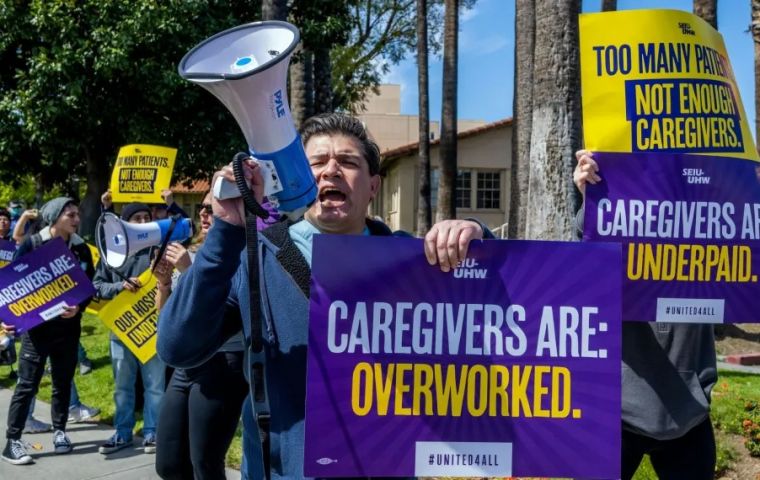MercoPress. South Atlantic News Agency
US: Healthcare workers on strike as syphilis cases mount
 Bicillin L-A remains the main treatment for primary and secondary syphilis
Bicillin L-A remains the main treatment for primary and secondary syphilis After over 75,000 healthcare workers began a strike until next Saturday, the United States is facing one of the largest-ever stoppages in the history of the sector, it was reported.
More than 75,000 unionized Kaiser Permanente employees began the largest workers' strike in the country's history on Wednesday, which will last until next Saturday. Kaiser Permanente is one of the largest not-for-profit healthcare providers in the United States. Its reach is such that it affected several states in the country including California, Colorado, Washington, Virginia, Oregon, and Washington DC.
Healthcare workers are demanding better working conditions and safer environments as the pandemic caused a staffing shortage that affects patient care and pushes workers to the limit.
The strike is being carried out by nurses, nutritionists, receptionists, pharmacists, and optometrists. These groups initiated the strike after their contracts ended without reaching an agreement with the healthcare provider, which intends to “continue negotiating” to reach “a fair and equitable agreement.”
The workers who stopped their activities in search of a better labor agreement are part of eight unions that make up 40% of Kaiser Permanente's total staff. Kaiser Permanente provides care at 39 hospitals and more than 700 physician offices.
Although the strike will end on Saturday, the largest union in the coalition said that if no agreement is reached, they could go on strike again in November, which would be “longer and stronger.”
In this scenario, syphilis cases have been reported to be on the rise while drugs for their treatment are in short supply.
Organizations linked specifically to Sexually Transmitted Diseases (STDs) urged the White House to work with the pharmaceutical company Pfizer to be able to supply all clinics. Thirty-nine public health groups, which include the National Coalition of STD Directors sent the letter to the White House Drug Shortage Task Force telling how healthcare facilities are having trouble ordering the drug needed to treat syphilis, Bicillin, a long-acting injectable form of penicillin. “Bicillin L-A remains the preferred treatment for primary and secondary syphilis in adults, infants, and children, and the only approved treatment for syphilis in pregnant women,” it was explained.
“As the only manufacturer of penicillin G benzathine in the United States, Pfizer's inability to provide adequate quantities of Bicillin L-A has left the Food and Drug Administration, the Centers for Disease Control and Prevention, and many state and local health departments scrambling to ration existing products, supply the drug, and develop contingency plans,” reads the letter.
“Affected communities and key stakeholders need to know the exact causes of the current shortage, including how Pfizer plans to address this situation quickly and prevent it from happening again. Investments in shortage prevention efforts should be prioritized, and we hope the company is already moving toward resolving the Bicillins L-A shortage sooner than indicated. But we need the support of the Drug Shortages Task Force to ensure accountability,” it went on.
The National Coalition of STD Directors told CNN that Washington has not yet responded to the letter, which also pointed out that the 2017 Bicillin shortage “coincided with a significant increase in congenital syphilis cases that has worsened dramatically since then.” From 2017 to 2021, reports the Centers for Disease Control and Prevention (CDC), syphilis cases increased by 74% and congenital (inherited) syphilis increased by 203%.
A White House spokesperson said in a statement that the Biden administration “remains focused on strengthening the resilience of critical supply chains, including those for medical products such as pharmaceuticals. President Biden has issued five executive orders to catalyze government-wide action toward these goals. This work to strengthen pharmaceutical supply chains is a continuation of the work that began on day one of President Biden's administration to ensure that Americans can access the medicines they need when they need them.”
“It is the result of a complex combination of factors including significant increases in demand, due to an increase in syphilis infection, as well as a shortage of competition. To meet this increased demand, Pfizer has prioritized manufacturing capacity.”
On the other hand, Pfizer stressed in an email that it increased Bicillin production by 30% in 2023 to be able to double the work next year, but that this growth will take time to be seen in the market. However, in July they admitted from the company that the problem might not be solved until 2024. At that time, they sent a letter to the groups saying that the “supply disruption” hurting Bicillin “is the result of a complex combination of factors, including significant increases in demand, due to an increase in syphilis infection, as well as a shortage of competition. To meet this increased demand, Pfizer has prioritized manufacturing capacity.”




Top Comments
Disclaimer & comment rulesCommenting for this story is now closed.
If you have a Facebook account, become a fan and comment on our Facebook Page!